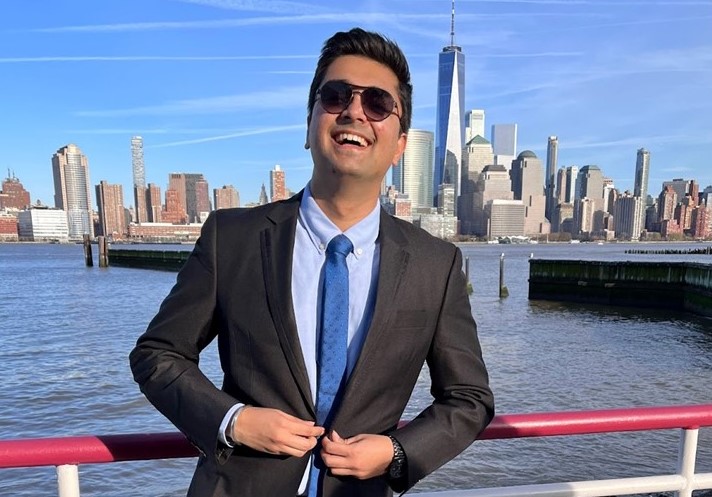

Shaurya Malik completed his undergraduate degree in computer science and engineering at Manipal Institute of Technology in India and worked as a software development engineer for Honeywell before enrolling in the M.S. in Data Science program at Columbia University. The 2022 alumnus is excited to use his extensive skill set in a new risk analysis role with McKinsey & Company.
Here, Malik discusses his background and how his experiences at Columbia and through the Data Science Institute (DSI) positively impacted him and set him up for success.
What helped to pique your interest in data science?
I was introduced to the realm of data science while enrolled in my undergraduate program. Some industrial professionals were visiting to conduct a seminar on unsupervised machine learning methods for faculty and students. I began reading more about this field and learned how advancements in artificial intelligence and statistics have the potential to change the world. This led me to pursue a minor in intelligent systems during undergrad, which introduced me to several courses and research domains in data science.
Why did you choose to come to Columbia for your master’s degree?
The Columbia M.S. in Data Science program is very well-structured. The courses are very well balanced between statistical and machine learning algorithms and give you the opportunity to succeed in all your endeavors as a data scientist in the industry. Additionally, Columbia itself is a very prestigious university and getting the opportunity to study at one of the world’s best education hubs—with really esteemed faculty and an accomplished peer group—was hard to ignore. Lastly, New York City was a huge reason for choosing Columbia and DSI!
What do you like most about living in New York City?
I can draw a lot of parallels between New York City and Mumbai. They’re both financial capitals, both cities that never sleep, and both surrounded by beautiful bodies of water. Most importantly, they are a melting pots of people from various walks of life, backgrounds, cultures, and values. Living in the United States was a new and fun experience. I eased into it all thanks to the great support system of my family and friends, old and new.
How did your undergraduate experience at Manipal prepare you for Columbia’s M.S. in Data Science program?
Taking a minor in intelligent systems led me to courses such as artificial intelligence, machine learning, natural language processing, social network analysis, and soft computing paradigms. These courses along with several massive open online courses really helped me prepare and understand what to expect. I recommend brushing up your probability and statistics skills as well as taking several online courses if one has the time.
What were your favorite courses during the M.S. in Data Science program?
My favorite core course was Machine Learning taught by John Paisley. It was a quite rigorous course, but it taught me a lot about several key algorithms. I always refer to the course material to revisit certain concepts and topics. My favorite elective was Natural Language Processing taught by Daniel Bauer. In addition to the well-organized course structure, the course was one that helped me realize my interest in language and speech processing. I have gone on to pursue several projects related to natural language processing and worked as a teaching assistant for two consecutive semesters.
Tell us about your capstone project?
My capstone project was Market Basket Analysis with Ralph Lauren. My team members included Keertan Krishnan, Rahul Agarwal, Rahul Subramaniam, and Myles Ingram. Our project aimed to study the changes in customer/user experience and behavior as the firm carries out several tests on the shop floor. We learned more about market basket analysis algorithms, cannibalization, and halo effects, and got the opportunity to improve our data visualization skills.
Did you complete an internship during the program?
I had the opportunity to intern as a summer analyst at Nomura. My internship was entirely remote, but the role was associated with the New York City office. I was a part of the Equity Derivatives team, working primarily in data engineering, devops, and software development.
You mentioned your remote summer internship. How else did the pandemic impact your Columbia experience?
I was admitted for the Fall 2020 cohort, but could only initiate my program in Spring 2022. Initially, taking courses virtually was not my favorite experience. It took a lot away from the graduate experience and it was very hard to interact with other folks in the same course. But what made it super easy was joining a student organization such as DSI Student Council, of which I served as president. This helped me meet a lot of new people in the cohort and make some wonderful friends.
What else did you gain during your Columbia experience?
1. The opportunity to learn from some of the most distinguished faculty members around the world.
2. An accomplished peer group that helped me learn more, faster, and better. These peers and colleagues are now some of my closest friends.
3. My time as a member and president of the DSI Student Council was really memorable. We worked to improve the M.S. in Data Science program based on students’ needs. We also worked on some interesting new ideas, including a podcast.
This interview has been edited and condensed for clarity.
Read More: Meet Shaurya Malik, Data Science Institute Student Council President